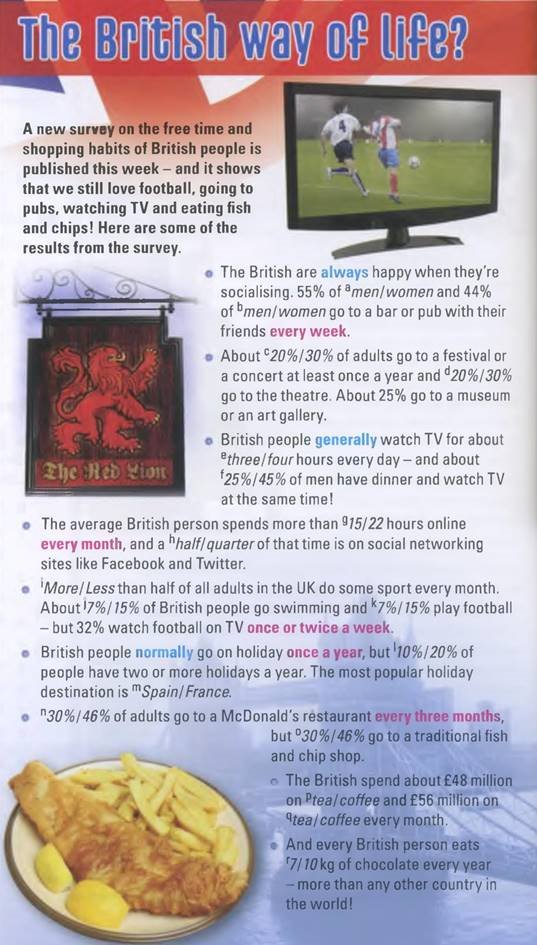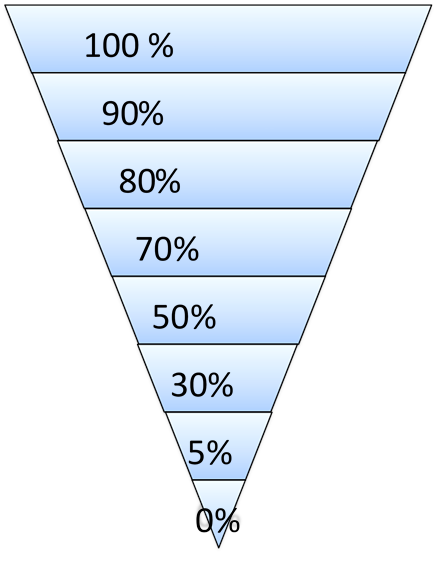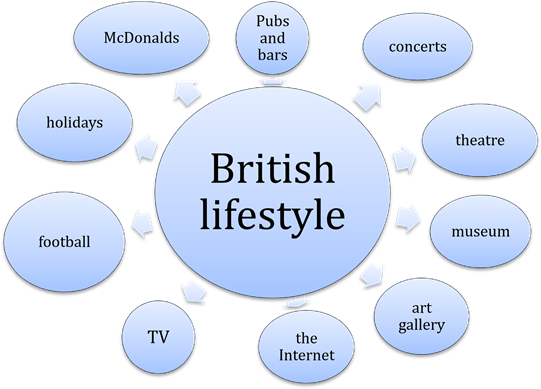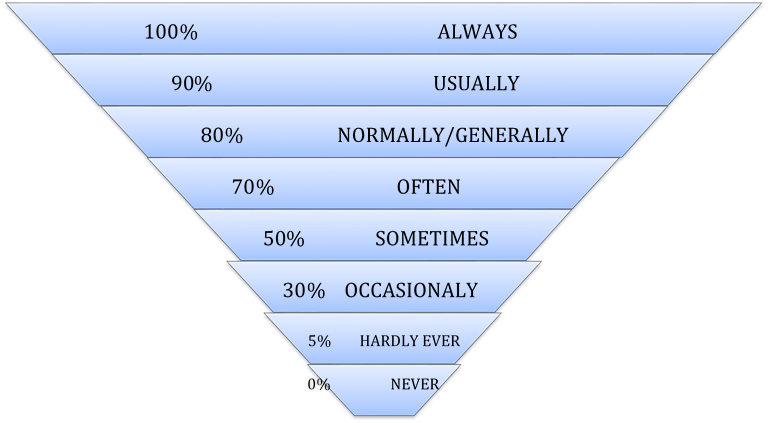Урок "Adverbs and expressions of frequency"
LESSON PLAN
|
Lesson Focus: Vocabulary |
Length: 60 min |
|
Lesson Aim By the end of the lesson, students will be better able to use the TL (expressions of frequency and adverbs of frequency) to discuss regular activities and routine.
Subsidiary Aim Practice correct word order of affirmative sentence for the Present Simple
|
|
Materials (What you will need in this lesson) Write title, author, year and publisher here and on your copies.
Text “The British way of Life?” p.10 Student’s Book Face to Face Pre-intermediate, Chris Redston&Gillie Cunningham, 2012, Cambridge University Press
Handout1 with tasks, adapted from p.11 Student’s Book Face to Face Pre-intermediate, Chris Redston&Gillie Cunningham, 2012, Cambridge University Press
Handout 2, Ex 4c +4d, p.11 Student’s Book Face to Face Pre-intermediate, Chris Redston&Gillie Cunningham, 2012, Cambridge University Press
Handout 3 with tasks, adapted from p.11 Student’s Book Face to Face Pre-intermediate, Chris Redston&Gillie Cunningham, 2012, Cambridge University Press
|
|
Assumptions What do you expect the students will know about your target language/content of your lesson?
The students will be familiar with the meaning, pronunciation and form of the Present Simple |
|
|
Anticipated problems (classroom management, content – NOT language):
1. Language presentation might take too long therefore students will not have much time for practice.
2. There might be an odd number of students
|
Solutions to these problems:
1. If students are doing well with the TL I will ask them to order words in only 6 sentences, instead of 10 during the controlled practice, so they will have time for semi-controlled practice. If we do not have much time for semi-controlled practice I will ask students to make 2 sentences to have time for feedback.
2. I will ask some students to work in group of three, for each pair-work I will change the students who work in trio.
|
|
White board plan: Draw the board as it will look at each stage of the lesson. |
|
Stage 1
|
|
Stage 2
The British are always happy when they’re socializing.
British people generally watch TV for about three hours |
|
Stage 3
The British are always happy when they’re socializing. British people generally watch TV for about three hours.
|
|
Stage 4 British people watch football on TV once or twice a year.
|
|
Stage 5 Х1 х2 British people watch football on TV once or twice a year.
1 twice a day 2 three times a week 3 every Saturday 4 every couple of weeks 5 once a month 6 once every three month 7 twice a year 8 once a year
|
|
Time |
Interact ion |
Stage & Aim |
Procedure |
|
3 min |
OC |
1 Lead-in To engage the students into the context of the lesson |
Ask the students what interesting facts about how the British spend their free time from the text they remember (Handout 1): “What do British people do in their free time?” “Do they go to the cinema/museums?” Present it in as a cluster on the board. |
|
2 min |
T SSS |
2 Highlighting To draw the students’ attention to the TL in the text |
Ask students to find model sentences in the text: “What do they say about socializing?” To elicit “The British are always happy when they’re socializing.” Write it on the board.
“What do they say about TV?” To elicit: “British people generally watch TV for about three hours.” Write it on the board.
|
|
1 min
2 min
|
T SSS
T
|
3 Clarification To clarify meaning, form and phonology of adverbs of frequency
|
To elicit the meaning of “always”: “Which word tells us how often they do it?” Circle it. To elicit the meaning of “generally”: “Which word tells us how often they do it?” Circle it.
Instruct students about following task, chest Handout 2 with sentences from the text: “Find words that answer the question “How often? Order them in a pyramid. You have three minutes” Give example by eliciting meaning of the word “always”:”Where do we put “always”?” |
|
3 min
3 min
2 min
4 min
|
S
SS
OC
T SSS
S
OC |
|
Ask ICQ: “Do you do it individually? How much time do you have?” Give students Handout 2. Meanwhile, put the pyramid on the board with percentage of frequency, without TL
Set the pairs and ask students to pair check.
Conduct open-class feedback. Write the correct answers on the board. Elicit and highlight features of phonology in red, model and drill problematic words chorally and individually.
Ask the students to look at the adverbs in the Handout 2. Elicit its position in the sentence: “Look at the sentences. Find the adverb. Is it before or after verb to be? (underline the verb in the model sentence on the board). Is it before or after other verbs? (underline the verb in the model sentence on the board)”
Ask students to complete the rules in the Handout 3. Conduct open-class feedback. |
|
2 min |
T SSS
|
4 Highlighting To draw the students’ attention to the TL in the text |
Ask students to find model sentences in the text: “What do British people say about football?” Elicit: “British people watch football on TV once or twice a year.” Write it on the board.
|
|
2 min
|
T SSS
|
5 Clarification To clarify meaning, form and phonology of expressions of frequency |
Elicit the meaning of “once” and “twice”: “How often do they do this?”Underline it in the sentence. Write x1 and x2 over the words on a board.
|
|
3 min
2 min
3 min
3 min |
T SSS
SS
OC
S
OC |
|
Instruct students about following task, chest Handout 4 with sentences from the text: “Find words that answer the question “How often? Put them in order. You have 3 minutes” Give example by eliciting meaning of “once a year” and “twice a year”: “What is more often?” Write it on the board in order “8- once a year; 7- twice a year” Ask ICQ: “Do you do it individually? How much time do you have?” Give students Handout 4.
Set the pairs and ask students to pair check. Conduct open-class feedback. Write the correct answers on the board.
Elicit and highlight features of phonology in red, model and drill problematic words chorally and individually. Ask the students to look at the adverbs on the handouts. Elicit its position in the sentence: “Look at the sentences. Where do we put these expressions in sentence?” (underline the expressions of frequency in the model sentence on the board)
Ask students to complete the rules in the Handout 5. Conduct open-class feedback. |
|
1 min
3 min
3 min |
T SSS
S
SS |
6 Controlled practice To practice accurate use of the TL, to focus on form |
Instruct students on the task. Chest Handout 6 with the exercise: “Put the words of these sentences in order. Write the sentence in free lines. You have three minutes.” Ask ICQ: “Do you work with a partner? How much time do you have?” Give handouts.
Ask students to work in pairs and check the answers: “Work with your partner and |
|
2 min |
OC |
|
check your answers. You have 3 minutes” Ask ICQ: “Do you work individually? How much time do you have?”
Conduct an open class feedback. Handout the correct answers. |
|
1 min
3 min
3 min
3 min |
T SSS
S
SS
OC |
7 Semi-controlled practice To practice accurate use of the TL in a more personalized way. |
Ask students to make true sentences about them with free time activities from the cluster and the adverbs and expressions of frequency: “Tell you partner how often you do these things in your free time.” Give an example: “I often go to the theatre.” Set the timing: “”You have three minutes” Ask ICQ: “What words should you use? How much time do you have?”
Set the pairs and ask students to pair check.
Conduct an open class feedback. Elicit information about their partner. |
|
1 min
2 min
3 min |
T SSS
SS
OC |
8 Language feedback To upgrade students’ language accuracy. |
Delayed error correction. Write some mistakes on the board.
Ask students to think about the mistakes in pairs. Give them 2 minutes
Elicit and correct the written mistakes. |
Handout 1

©.Taken from Face2Face Student’s Book Pre-Intermediate by Chris Redston&Gillie Cunningham, 2012, Cambridge
University Press, p.10
Handout 2

1. The British are always happy when they’re socializing.
2. British men often watch TV and have dinner at the same time.
3. The British usually go to bars or pubs at the weekend.
4. They sometimes go to a museum or an art gallery.
5. British people occasionally have two or more holidays a year.
6. They normally go on holiday to Spain.
7. The average British person is never offline for a long time.
8. British people hardly ever practice swimming.
Intermediate Student’s Book by Chris Redston&Gillie Cunningham, 2012, Cambridge University Press, p.11, ex 4a
Where do we put these words in the sentence?
BEFORE or AFTER?
________ verb to be
The British are always happy when they’re socializing.
The average British person is never offline for a long time.
________ main verb
British men often watch TV and have dinner at the same time.
British people occasionally have two or more holidays a year.
University Press, p.11, ex 4b
|
1. British people go on holiday once or twice a year.
2. Adults go to a McDonald’s restaurant once every three months.
3. The British watch football on TV twice a week.
4. They go to pubs and bars every Saturday.
5. The British drink tea twice a day.
6. British people don’t go to a museum three times a week.
7. British people go to a traditional fish and chip shop every couple of weeks. |
1 ___________________________ 2 ___________________________ 3 ___________________________ 4 ___________________________ 5 ___________________________ 6 ___________________________ 7 ___________________________ 8 ___________________________ |
8.British people go swimming once a month.
University Press, p.11, ex 4c
Where do we put these words in the sentence?
We usually put them before the verb/ at the end of the sentence.
They go to pubs and bars every Saturday.
The British drink tea twice a day.
British people don’t go to a museum three times a week.
University Press, p.11, ex 4d
Handout 6
1. running/go/sometimes/on Sundays/I
________________________________________________ 2. do/ a week/ normally/ or twice/ I/ once/ yoga
________________________________________________
3. months/ I/ every/ go to/ once/ six/ the dentist
________________________________________________
4. am/on Sundays/I / home/ generally/ at
_______________________________________________
5. of weeks/every/go/swimming/ I/ couple
________________________________________________
6. am/ in July/ always/ I / on holiday
________________________________________________
7. I/ two/ an art gallery/ times/ go to/ or three/ a year
________________________________________________
8. volleyball/ play/ occasionally/ at/ I/ the weekend
________________________________________________ 9. a year/ my/ I/ or twice/grandparents/ once/ see
Keys:
1. I sometimes go running on Sundays.
2. I normally do yoga once or twice a week.
3. I go to the dentist once every six months.
4. I am generally at home on Sundays.
5. I go swimming every couple of weeks.
6. I am always on holiday in July.
7. I go to an art gallery two or three times a year.
8. I occasionally play volleyball at the weekend
9. I see my grandparents once or twice a year
©.Taken from Face2Face Student’s Book Pre-Intermediate by Chris Redston&Gillie Cunningham, 2012, Cambridge University Press, p.11, ex 5


про публікацію авторської розробки
Додати розробку


